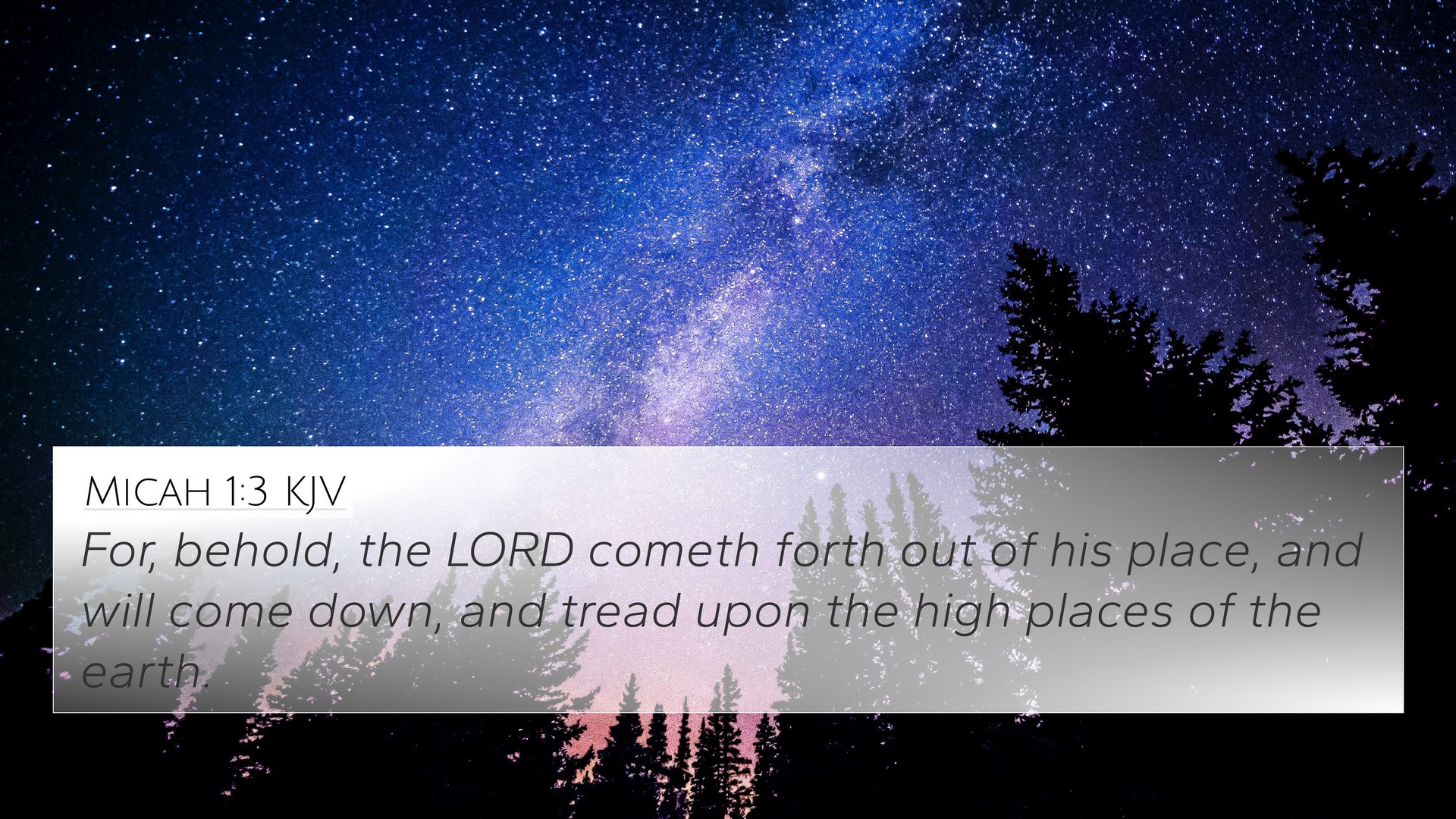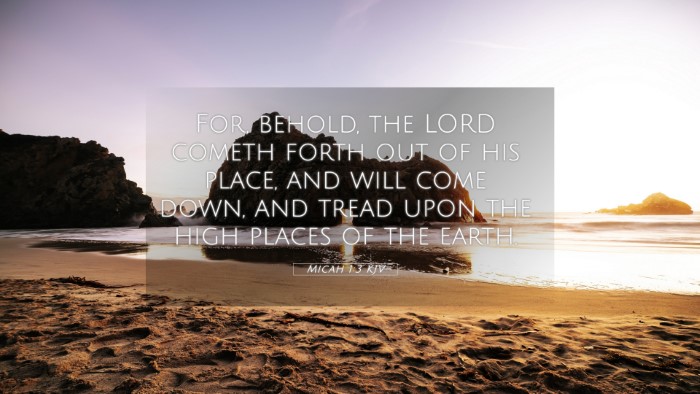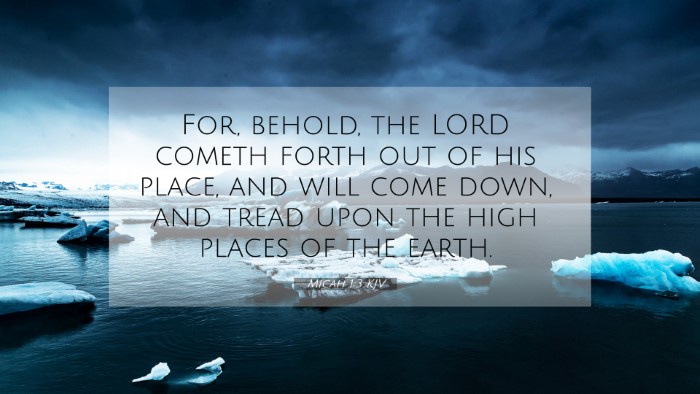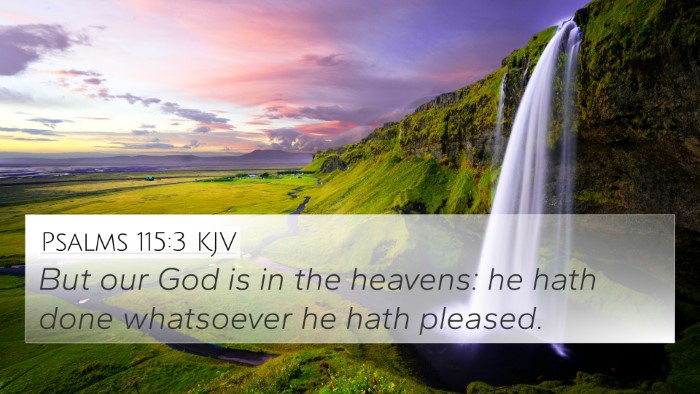Old Testament
Genesis Exodus Leviticus Numbers Deuteronomy Joshua Judges Ruth 1 Samuel 2 Samuel 1 Kings 2 Kings 1 Chronicles 2 Chronicles Ezra Nehemiah Esther Job Psalms Proverbs Ecclesiastes Song of Solomon Isaiah Jeremiah Lamentations Ezekiel Daniel Hosea Joel Amos Obadiah Jonah Micah Nahum Habakkuk Zephaniah Haggai Zechariah MalachiMicah 1:3 Similar Verses
Micah 1:3 Cross References
For, behold, the LORD cometh forth out of his place, and will come down, and tread upon the high places of the earth.
Uncover the Rich Themes and Topics of This Bible Verse
Listed below are the Bible themes associated with Micah 1:3. We invite you to explore each theme to gain deeper insights into the Scriptures.
Micah 1:3 Cross Reference Verses
This section features a detailed cross-reference designed to enrich your understanding of the Scriptures. Below, you will find carefully selected verses that echo the themes and teachings related to Micah 1:3 KJV. Click on any image to explore detailed analyses of related Bible verses and uncover deeper theological insights.
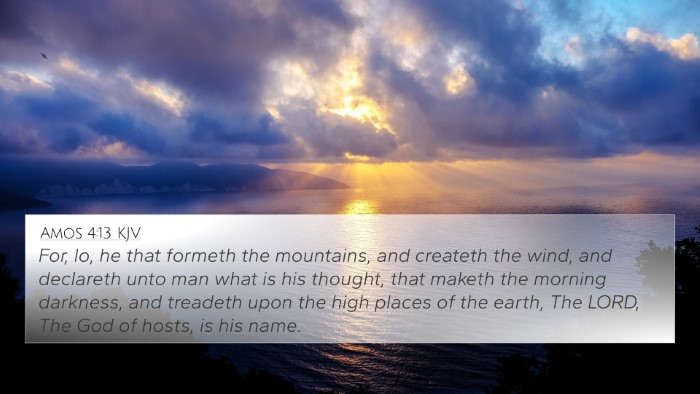
Amos 4:13 (KJV) »
For, lo, he that formeth the mountains, and createth the wind, and declareth unto man what is his thought, that maketh the morning darkness, and treadeth upon the high places of the earth, The LORD, The God of hosts, is his name.
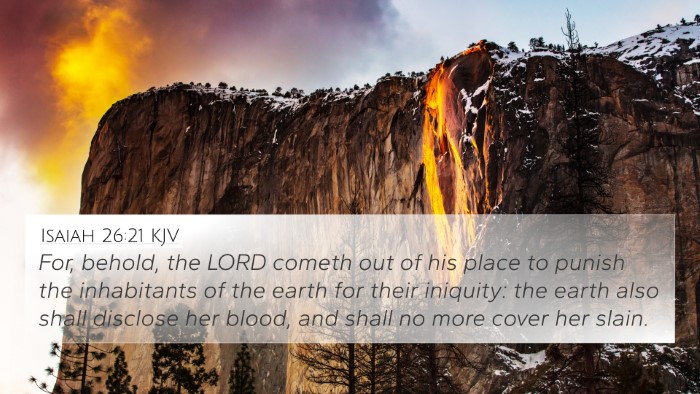
Isaiah 26:21 (KJV) »
For, behold, the LORD cometh out of his place to punish the inhabitants of the earth for their iniquity: the earth also shall disclose her blood, and shall no more cover her slain.
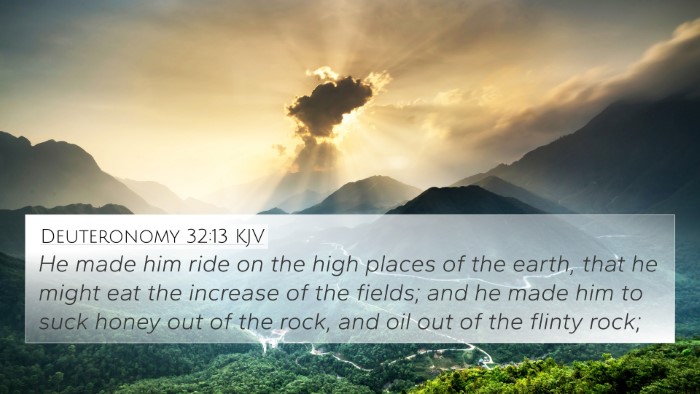
Deuteronomy 32:13 (KJV) »
He made him ride on the high places of the earth, that he might eat the increase of the fields; and he made him to suck honey out of the rock, and oil out of the flinty rock;
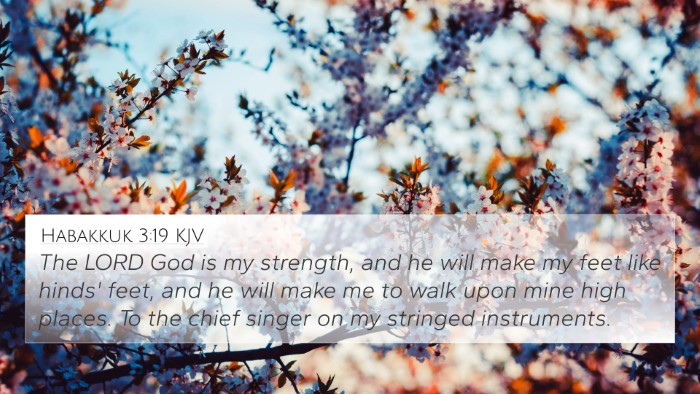
Habakkuk 3:19 (KJV) »
The LORD God is my strength, and he will make my feet like hinds' feet, and he will make me to walk upon mine high places. To the chief singer on my stringed instruments.
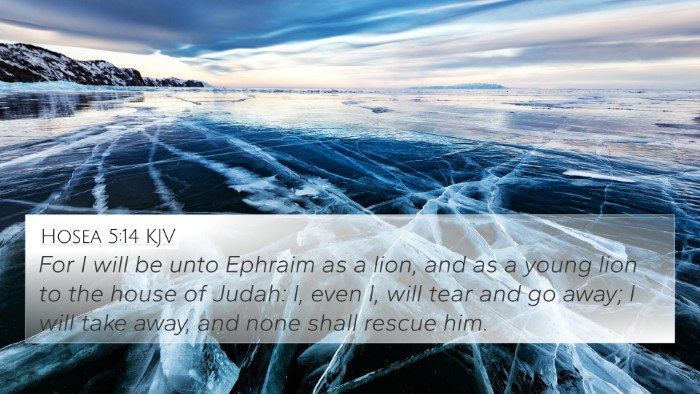
Hosea 5:14 (KJV) »
For I will be unto Ephraim as a lion, and as a young lion to the house of Judah: I, even I, will tear and go away; I will take away, and none shall rescue him.
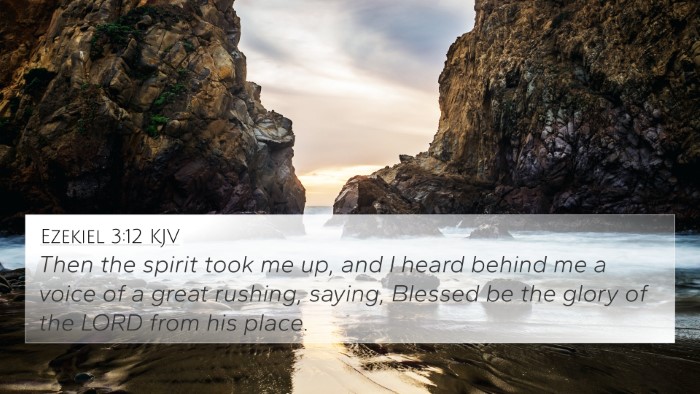
Ezekiel 3:12 (KJV) »
Then the spirit took me up, and I heard behind me a voice of a great rushing, saying, Blessed be the glory of the LORD from his place.
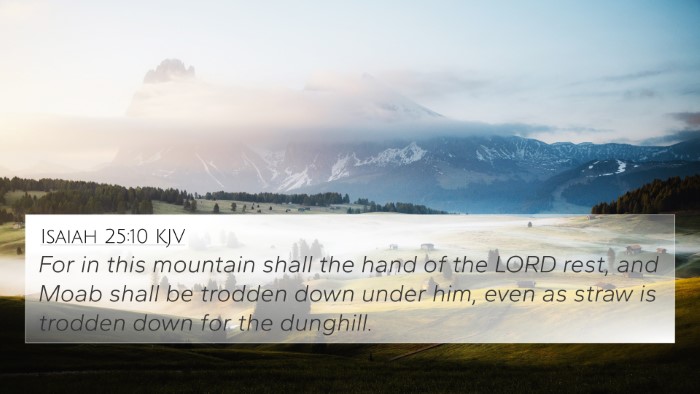
Isaiah 25:10 (KJV) »
For in this mountain shall the hand of the LORD rest, and Moab shall be trodden down under him, even as straw is trodden down for the dunghill.
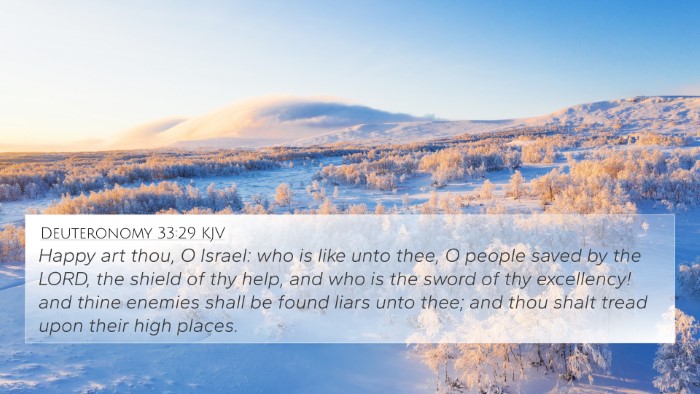
Deuteronomy 33:29 (KJV) »
Happy art thou, O Israel: who is like unto thee, O people saved by the LORD, the shield of thy help, and who is the sword of thy excellency! and thine enemies shall be found liars unto thee; and thou shalt tread upon their high places.
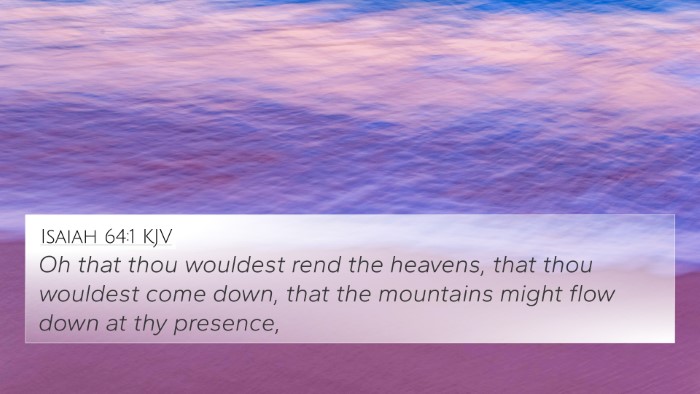
Isaiah 64:1 (KJV) »
Oh that thou wouldest rend the heavens, that thou wouldest come down, that the mountains might flow down at thy presence,
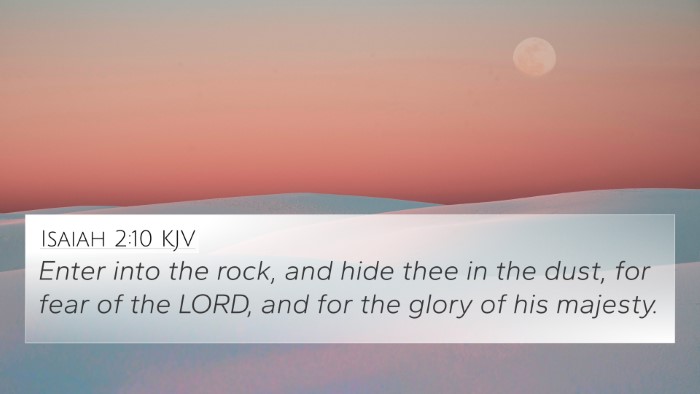
Isaiah 2:10 (KJV) »
Enter into the rock, and hide thee in the dust, for fear of the LORD, and for the glory of his majesty.
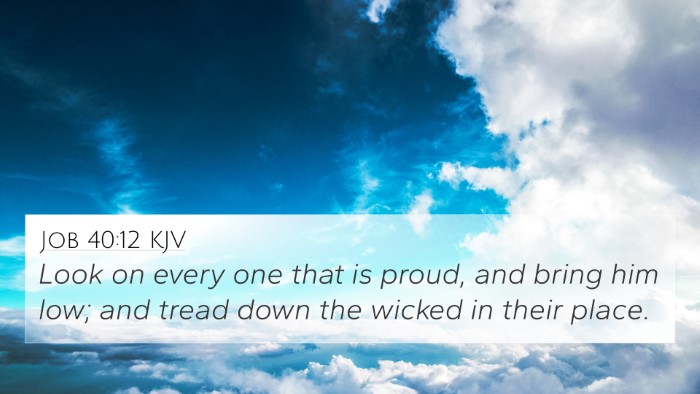
Job 40:12 (KJV) »
Look on every one that is proud, and bring him low; and tread down the wicked in their place.
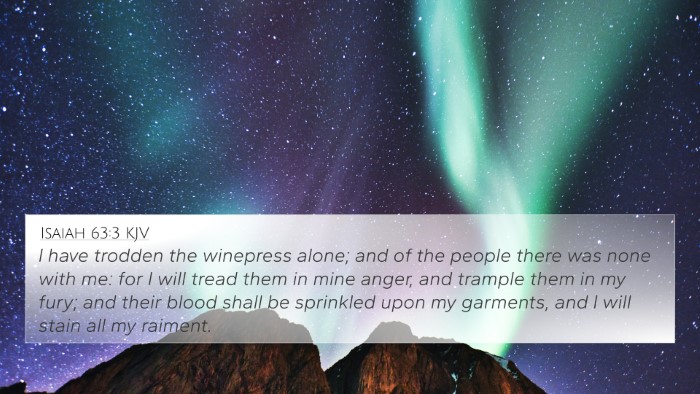
Isaiah 63:3 (KJV) »
I have trodden the winepress alone; and of the people there was none with me: for I will tread them in mine anger, and trample them in my fury; and their blood shall be sprinkled upon my garments, and I will stain all my raiment.
Micah 1:3 Verse Analysis and Similar Verses
Micah 1:3 - Summary and Interpretation
Micah 1:3 states: "For, behold, the LORD cometh forth out of his place, and will come down, and tread upon the high places of the earth." This powerful verse serves as an introduction to God's coming judgment and sovereignty over the earth. The usage of "behold" commands attention, emphasizing the significance of the divine visitation that is imminent.
Insights from Public Domain Commentaries
- Matthew Henry's Commentary:
Henry emphasizes that God's coming is not only an act of judgment but also a declaration of His authority over all creation. The phrase "tread upon the high places" symbolizes His power over both the earthly authorities and the idolatrous practices prevalent among the people.
- Albert Barnes' Notes:
Barnes highlights the irony in Israel’s reliance on high places for worship, noting that God will bring down these false places of worship. This illustrates the theme of divine intervention to restore true worship and righteousness among His people.
- Adam Clarke's Commentary:
Clarke interprets 'the high places' to symbolize both literal mountains and metaphorical positions of pride and self-sufficiency. He points out that God’s coming signifies the end of such false security, ushering in a new order established by divine authority.
Verse Connections and Cross-References
The verse connects deeply with the overarching Biblical narrative of God's judgment and mercy. Below, you will find cross-references that support and enhance the understanding of Micah 1:3:
- Isaiah 2:12: "For the day of the LORD of hosts shall be upon every one that is proud and lofty..." - Illustrating God’s judgment against pride.
- Zephaniah 1:2-3: Indicates the coming of the LORD to destroy idolatry and cleanse the land.
- Amos 4:13: "For, lo, he that formeth the mountains, and createth the wind..." - A reminder of God’s power as Creator.
- Psalm 68:15-16: Describes the might of God and His sovereignty over high places.
- Jeremiah 4:13: "Behold, he shall come up as clouds, and his chariots shall be as a whirlwind..." - A prophetic announcement of God’s powerful coming.
- Revelation 6:14: "And the heaven departed as a scroll when it is rolled together..." - Symbolizes the final judgment and the divine act of renewal.
- Micah 3:12: "Therefore shall Zion for your sake be plowed as a field..." - Continuing the theme of judgment and restoration for the sake of God’s people.
Thematic Bible Verse Connections
Micah 1:3 also establishes themes of divine presence, justice, and the futility of idolatry, resonating throughout both the Old and New Testaments. Here are some key thematic connections:
- God's sovereignty over nations and cities (Psalm 47:8)
- The call for repentance and return to God (Hosea 12:6)
- The climatic intervention of God in human history (Acts 17:31)
- God's commitment to justice and righteousness (Amos 5:24)
- The assurance of divine help and deliverance (Psalm 46:1)
Tools for Effective Cross-Referencing
To dive deeper into the study of Micah 1:3 and explore its connections, methods, and themes, consider the following tools and approaches:
- Bible Concordance: A foundational resource for finding specific references and words throughout the scriptures.
- Bible Cross-Reference Guide: Guides that help connect verses based on similar themes and ideas.
- Cross-Reference Bible Study: Structured study methods allowing for detailed examination of related passages.
- Bible Reference Resources: Comprehensive lists and compilations that assist in identifying and understanding scripture connections.
Understanding Biblical Cross-References
Understanding how to find and utilize Bible cross-references can tremendously enhance one’s study experience. Here are some methods and insights:
- Identifying Connections: Look for similar phrases, themes, or topics within different books of the Bible.
- Using Study Bibles: Many Bibles have built-in cross-references that are invaluable for deeper studies.
- Comparative Studies: Engage in studies that compare verses across different genres of Biblical literature, like the Prophets and the New Testament letters.
- Consulting Biblical Commentaries: Commentaries offer in-depth analysis and provide cross-references that may not be readily visible.
Conclusion
Micah 1:3 serves as a cornerstone for understanding God’s dynamic relationship with His creation, focusing on judgment, authority, and the eventual restoration of righteousness. By engaging in comparative Bible verse analysis and utilizing available resources for cross-referencing, believers can deepen their understanding of this profound scripture and its implications for their faith journey.
